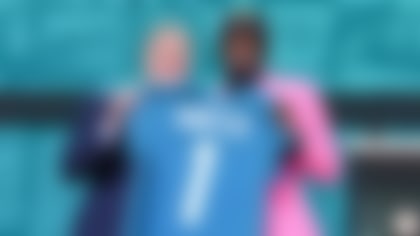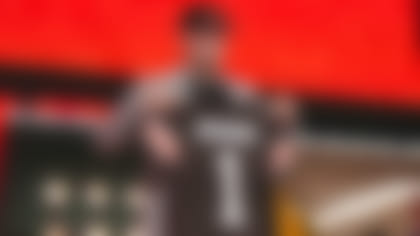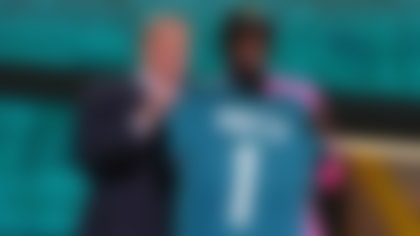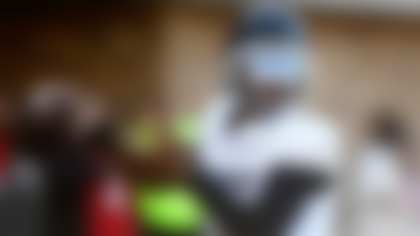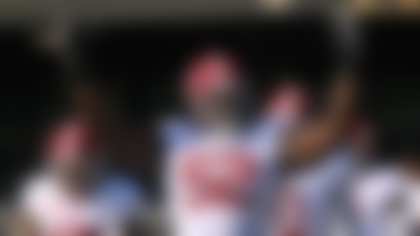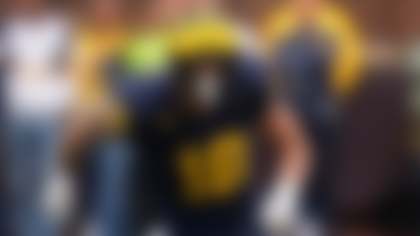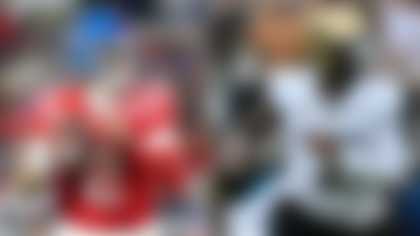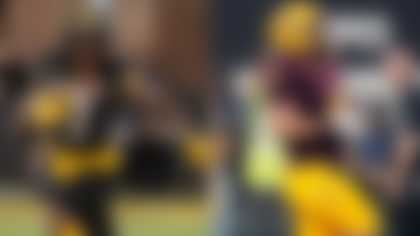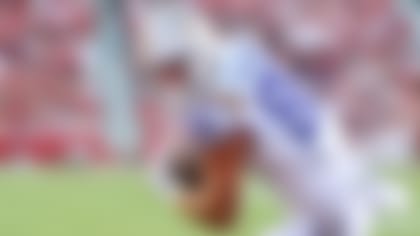A lean and hungry look. When we see torches being passed in sports, I think back to that quote from Julius Caesar. (Yes, majoring in English means you read a lot of Shakespeare. I can run every Jeopardy category on it that has ever existed.) Commonly, a torch is handed over due to the natural passage of time. A player retires, making it possible for a new one to take his place. Other torch passings, like what we saw Monday night, are much rarer: When, on the field of battle, one player wrests the torch from hands not ready to surrender it. These kinds of torch passings are the most interesting, because we see the participants together, matching wills. In this case, Kevin Durant's Cassius vanquished Kobe Bryant and the Los Angeles Lakers. I am going to take this from you. Durant was incredible in the fourth quarter -- his smile and sneer sparkled, with his Oklahoma Thunder having broken a close game open, while Kobe's eyes looked very far away. Kobe was telling us there that it was over. It brings to mind three other true torch-passing moments in the NFL the past three decades -- team to team, quarterback to quarterback and coach to coach. If the NFL's stories tell us anything, Kobe's days of winning titles are likely over.
1981: THE RISE OF THE WEST. "The Catch" by Dwight Clark, which helped the San Francisco 49ers beat the Dallas Cowboys in the NFC Championship game, wasn't just one of the most memorable plays in NFL history, it completely ended the era of NFC dominance the Cowboys had enjoyed for the entire 1970s. The Cowboys thought they were still the team they had been, and there were many indications that they still might have been. Danny White had taken over for Roger Staubach the year before and played at a pretty high level. Tony Dorsett was in his prime. Drew Pearson was flanked by Tony Hill and Butch Johnson. The defense still had Harvey Martin and Randy White and "Too Tall" Jones, in addition to a talented young secondary. The 49ers' win was jarring, in that the Cowboys really had shown no sign of slowing down. Nope, they were still America's Team. Until that day.
When you slay a giant, you become a giant. After that 28-27 victory, the 49ers became the team of the 1980s, winning three more titles over the next eight years. Dallas? The following year (the strike season of 1982) the Cowboys lost to the Washington Redskins in the NFC title game by two touchdowns. In 1983, they lost a wild-card game to the Los Angeles Rams at home. The Cowboys missed the playoffs the next season, and while they returned to the post-season in 1985, they were shut out in the wild card game by the, again, the Rams -- in Tom Landry's final playoff appearance. Dallas' era was over. It was a slow slide, but make no mistake, San Francisco provided that first push down the hill.
2001: THE LAST GREATEST PICTURE SHOW ON TURF. Kurt Warner's era of quarterback dominance was as sudden as it was shocking. In 2001, he was coming off his second MVP season, in which he threw for more than 4,800 yards and 36 touchdowns, leading the league in passer rating as well. By 2001, Warner had been otherworldly for three seasons, and it looked like the league would be his for years to come. The true path to NFL stardom, it turned out, was bagging groceries, not winning an SEC scholarship. Then came Tom Brady in Super Bowl XXXVI. No one knew what kind of game he'd play -- remember, he was coming off an injury in the AFC Championship Game that saw Drew Bledsoe leap off the bench to help stave off the Pittsburgh Steelers. It should have been a mismatch. But what I'll remember from that game is the continually frustrated look on Warner's face as things refused to go his way and plays blew up on the St. Louis Rams. Still, Brady was no world-beater that day, and I didn't think there was any way, with 1:30 left, he was going to lead the New England Patriots to the game-winning score. Then, of course, John Madden uttered his famous "I'd play for overtime" comment, which I bet he wishes he could take back.
In retrospect, we've since seen Brady engineer final drives like that plenty of times. A couple of short passes, a long one, another short one, and a clock spike with seven seconds left to set up Adam Vinatieri with the game-winning field goal. Yawn. Wake me when "60 Minutes" is on. But watching that sequence of events unfold back then, it was all new, and I was incredulous, seeing this kid mount such a drive after playing such an average game. You've seen that shot of Brady in the post-game celebration, where, with confetti falling around him, he has his hands on his head and an "aw-shucks" look on his face that says "I can't believe what I just did!" Don't fall for that. That grin is only for the cameras (and Gisele). Fast-forward, and the only guy bigger than Brady the last 10 years has been, well, Bieber. Meanwhile, Warner's subsquent fall was like a flash flood. He was never the same after that game. In 2002, he threw a lot of interceptions and broke a finger, missing most of the season. In 2003, he fumbled six times in the season opener against the New York Giants and lost his job for good to Marc Bulger. And while he did have a great second act much later on with the Arizona Cardinals, he never really reached the dizzying heights many thought he could in the early days of his career.
2011: THE UNEXPECTED GENIUS. I was deathly afraid of Bill Belichick. No matter what scheme my team drew up, I always knew he'd be one step ahead. How many times did I have to watch the New York Jets try to adjust to the Patriots' gameplan only to have Belichick come up with some wildly different tactic in the rematch? Seeing the Pats twice (and sometimes three times) per season unfortunately makes me an expert. But in the last few years, the "genius" label that has been applied to Bill Belichick has been starting to lose its luster. Eli, Tyree and Plaxico did the unthinkable in 2007, but at the time, that could be brushed off as a fluke. This past season, however? The real title of "genius" needs to go to Giants coach Tom Coughlin.
Twice now, he's defeated Belichick in Super Bowls. Twice, he's done it with a defensive style that kept the high-flying Patriots off the scoreboard, something no one else could do that season. Twice, he's done it with last-minute drives, turning the tables on a coach who's done that to everyone else for the last 10 years. Coughlin is a special kind of guy. I don't know that there's anyone who has his team more ready to play in all facets of the game than he does. While it seems like the Giants escape an awful lot, they're the ones who make the big plays at the end of games and control the final few minutes. I was on the field for Super Bowl XLVI, and I'll tell you, the Giants' body language told me that no matter what happened, New York would get the job done somehow. Now I feel about Coughlin the way I used to feel about Belichick. Sort of like how I feel now about 'Wolfmother' compared to how I used to feel about 'Guns & Roses.'
So what does this mean for Kobe Bryant? Hey, every star knows that at some point, his days will never be as bright as they once were. After someone who looks like you used to 10 years ago topples you on the field of play, you stay toppled. That secret ingredient, that thing that made you the best of the best, just isn't there anymore, whether because of age, a poor supporting cast, or the disappearance of that intimidation factor that used to win you a game or a round in the playoffs. You no longer have that extra special something that made you a champion, and it seems like the other guy took it from you.
Jason Smith writes fantasy and other pith for NFL.com. He hosts "NFL Fantasy Live" during the regular season on the NFL Network, and you can download his weekly "Cover Two" podcast, co-hosted by Steve Wyche, at NFL.com. Talk to him on twitter @howaboutafresca. He only asks you never bring up any time that the Jets played poorly.


